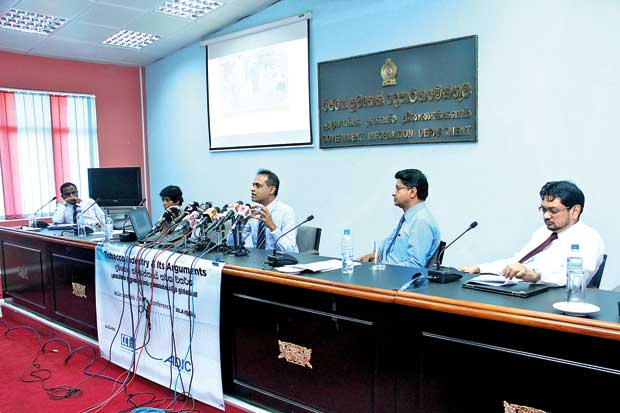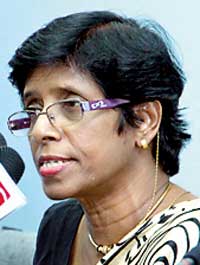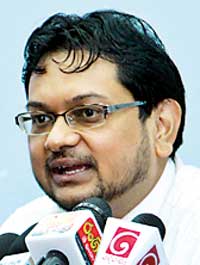Reply To:
Name - Reply Comment
Last Updated : 2024-04-18 14:58:00

 “The tobacco industry is publicizing false statements”
“The tobacco industry is publicizing false statements”
The Ceylon Tobacco Company (CTC) has made arrangements to increase the price of a cigarette to Rs.50 as a result of increasing the taxes on cigarettes by the government. The tobacco industry is publicizing many article-like ads using print media. Most of these articles help the tobacco company indirectly. They falsely use terms like “experts say” and “survey reports”.
They are creating a story that the increase in cigarette prices have led cigarette consumers to use beedi. This is false as there is no drastic change in the importing of Tendu leaves needed to make beedi; analysing 20 years’ worth data on Tendu leaf imports has revealed this. Tobacco companies have misled the media and the finance ministry purposely, hiding part of the chart showing Tendu leaf imports. The hidden truth is that the tobacco company has other cigarette products such as Capstain priced at Rs.20; but the so-called increase hasn’t affected this products’ market. Similarly, to jeopardize the enforcement of laws on legally manufactured cigarettes, tobacco companies are trying to benefit from this by highlighting the illicit cigarette business. It was pointed out that the unseen forces behind the said illicit businesses too are the multinational companies.
Though the tobacco company talks of a decrease in government taxes and revenues due to the escalation of cigarette prices, this is false, and tobacco companies are engaged in predicting a collapse in the near future of the tobacco industry. They are trying to discourage and mislead the government’s policymakers by not disclosing the revenues generated by VAT imposed on cigarettes by the government.
 partnerships and agreements with the tobacco industry. They should provide assistance to tobacco control legislation. Governments should prohibit the involvement of the tobacco industry in any youth, public education and other tobacco control initiatives"
partnerships and agreements with the tobacco industry. They should provide assistance to tobacco control legislation. Governments should prohibit the involvement of the tobacco industry in any youth, public education and other tobacco control initiatives" - Professor Jennifer Perera, Dean of the Faculty of Medicine, University of Colombo.
- Professor Jennifer Perera, Dean of the Faculty of Medicine, University of Colombo.
“Sri Lanka is the fourth country in the world and the first Asiatic country to ratify the FCTC (Framework Convention on Tobacco Control) treaty, the first global public health treaty adopted in May 2003 at the 56th World Health Assembly-the decision-making body of the WHO (World Health Organization). The FTCT treaty was powered in 2005. By now, 180 countries have ratified the treaty. It safeguards present and future generations from the social and economic impacts of the tobacco industry. The FTCT gives us the required law enforcement needed to protect public health policies.
“The government should refrain from entering into partnerships and agreements with the tobacco industry. They should provide assistance to tobacco control legislation. Governments should prohibit the involvement of the tobacco industry in any youth, public education and other tobacco control initiatives. Governments should prevent tobacco-related conflicts of interest for government bodies, officials and employees. They should also regulate purported ‘socially responsible’ activities carried out by the tobacco industry. Governments should prohibit incentives, privileges and benefits for the tobacco industry.”
Describing the CCT’s (Centre for Combating Tobacco) history, she noted “The CCT is the regional observatory in the South East Asia region. The organization is the result of negotiations between the WHO and Sri Lanka, especially NATA, (National Alcohol and Tobacco Authority). ADIC (Alcohol Drug Information Centre) and SLMA (Sri Lanka Medical Association) are also in the partnership.
 “They promote doubt and confusion in society”
“They promote doubt and confusion in society”
“The CCT was established in May 2016. We were doing research into tobacco and controlling it, even before the institution was established. The main mandate of the CCT is to monitor the tobacco industry in the country and the region. Now it is happening in a more systematic manner and on an academic level. This fight is not between smokers and non-smokers but a fight for us - you, me, political leaders and even tobacco company employees. We are fighting with the industry. In our observations we noted that tobacco companies are trying to maintain a good image. However, it has been observed around the world that the reality is very different. One in two smokers will die prematurely.
The WHO has the tobacco industry’s so-called conspiracies listed as intelligence gathering (to monitor opponents and social trends in order to anticipate future challenges), public relations (to mould public opinion using the media to promote stances favourable to the industry), political funding (to use campaign contributions to win votes and legislative favours from politicians), funding research including in universities ( to create doubt about the health effects of tobacco use) and smokers’ rights groups (to create an impression of spontaneous grass root public support). They are even influencing politicians and scientists and spreading false statements in society.
The tobacco industry spreads various other false statements such as “cigarette usage will reduce if the price is increased”. These opinions affect policymakers’ minds while also spreading doubt and confusion in society regarding scientific data and research.
 “There should be a transparent formula to increase the price of cigarettes”
“There should be a transparent formula to increase the price of cigarettes”
“The media has the power to shape public opinion. In 2014, the number of cigarettes sold was 3,560 billion. In 2015 it reported that there was a 10% increase by 3,960 billions and in 2016 cigar consumption decreased with tax amendments to 3,790 billion. Still the cigarette consumption is 7% - 8% higher than in 2014. It is the responsibility of the government to reduce cigarette consumption in the country. Yet the government has not succeeded in bringing the number down to the 2014 level.
In 2015 and 2016, cigarette production was higher than the sales. It is important to reduce consumption at least by 20%. It is essential to increase taxes and prices in reducing the consumption. Increasing taxes won’t affect revenue. In 2015, the government tax revenue from cigarettes was 80 billion. In 2016 it was nearly 90 billion. The government expected a tax revenue of more than 120 billion from the budget last year. The President has said the country should not depend on cigarette taxes. It is evident that revenue is increasing even though cigarette consumption has decreased by 25%.
Today, 74% of the price of a
cigarette is taxes.
In 2013/2014 they earned Rs.8.40 as profit for each cigarette. Their gross profit was more than 14.5 billion. In 2015, this profit increased to Rs.9.25 and the gross profit rose to 17.5 billion. When the government increased the tax, the cigarette company also increased its revenue from a cigarette by 40%. This data doesn’t include the profits the cigarette company earns through investments. According to their annual report, the gross profit in 2016 was 20.3 billion. Cigarette companies are among the highest income-earners in the stock market.
Cigarette companies are far more powerful than the NATA due to their influence and wealth.
There should be a transparent formula in increasing cigarette prices and discussion about the absence of one.
 “Illegal cigarette smuggling is brought up every three months prior to the budget”
“Illegal cigarette smuggling is brought up every three months prior to the budget”
“The illegal cigarette trade has been going on in this country for a while. We are reminded of this every three months prior to the budget. Tobacco companies even release the number of illegal cigarettes smuggled here but the customs and other relevant authorities don’t have this data,” Dr. Sajeeva Ranaweera said.
Since the 1950s, it has become clear that cigarette companies have been adding various ingredients into cigarettes and are experimenting with addiction levels. The American government sued the main tobacco companies in America, demanding compensation for the costs of providing treatment to smokers. These companies agreed to pay 225 billion dollars to the American government annually upto 2025. This relates to us because the tobacco company operating in Sri Lanka is a party in one of these four companies and 90% of the profit in tobacco company goes out of the country. And we keep sending money to treat those affected by smoking in America.”
Cigarette usage is reducing in European and America while it is increasing in Asia. Tobacco companies around the world are smuggling illegal cigarettes, hoping to break up tax systems and introduce new brands . There is evidence that this illegal cigarette trade is conducted by tobacco companies themselves.

Add comment
Comments will be edited (grammar, spelling and slang) and authorized at the discretion of Daily Mirror online. The website also has the right not to publish selected comments.
Reply To:
Name - Reply Comment
On March 26, a couple arriving from Thailand was arrested with 88 live animal
According to villagers from Naula-Moragolla out of 105 families 80 can afford
Is the situation in Sri Lanka so grim that locals harbour hope that they coul
A recent post on social media revealed that three purple-faced langurs near t